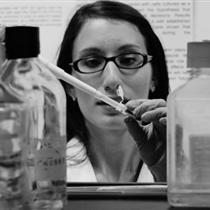A University of Windsor student has landed a prestigious research grant to help solve the mystery of why some breast cancer patients don’t respond to chemotherapy.
Rosa-Maria Ferraiuolo, who is pursuing a PhD in molecular biology, received a two-year $75,000 grant from the Canadian Breast Cancer Foundation to further her research on the Spy1 protein and help scientists develop tailored treatments for drugresistant cancers.
“We’re trying to see if this protein is driving drug resistance in patients,” said Ferraiuolo, who started her graduate degree in Dr. Lisa Porter’s lab in 2009.

University of Windsor PhD student Rose-Maria Ferraiuolo has received funding for research that could help scientists develop tailored treatments for drug-resistant cancers.
Spy1 is a protein required for normal breast cell growth but if the levels in the body are too high, it can stimulate tumour growth and the spread of cancer.
In the lab, Ferraiuolo has been testing how a high level of Spy1 protein in breast cancer cells responds to different cancer drugs, by exposing breast cancer cells to drugs that inhibit cell growth – such as tamoxifen and roscovitine – and then seeing if the levels of Spy1 in the cells have changed. Ferraiuolo also has a clinical trial going with local oncologist Dr. Caroline Hamm and local breast cancer patients, but using different cancer drugs.
The clinical trial involves comparing the levels of Spy1 protein in tissue samples from patients who received chemotherapy with samples from patients who received chemotherapy plus a drug called cisplatin, which can also be used in treatment to stop cells growing.
Based on each patient’s treatment outcome, the idea is to see if higher levels of Spy1 in the samples allow certain chemotherapy regimens to work or if patients require a different treatment approach.
In a sense, she said, it is the best of both worlds because she gets to conduct lab research and a clinical trial at the same time.
Her focus for the next two years is to get as much lab research done as possible and publish the findings. If she can fit it in, she said, she would like to test those findings in mice and – though the task might fall to future researchers in her lab – in actual patients.
“I do think this will end up in a clinical trial,” she said of the lab work.
Ferraiuolo is the second University of Windsor student in Porter’s lab to receive a CBCF grant. The funding is enough to cover her basic expenses so she does not have to work as a graduate assistant, essentially freeing up 10 more hours each week for her to spend in the lab and concentrate on her research. “It gives you more of an academic role in the graduate school,” she said.
“This fellowship is a tremendous advantage for the research in the lab,” Porter said. “Now (Ferraiuolo) will be able to just pour herself into her research.”
Ferraiuolo’s work is worth paying attention to because it looks at the mechanisms that could cause drug resistance, Porter said, and also because part of that research has already gone to clinical trial.
Ferraiuolo said she did not expect to receive the grant because she had already applied twice before and been turned down. In fact, she said, the email with the offer from CBCF went to her junk mail folder so she didn’t find out the news until Porter called her.
“I just started screaming in the lab,” Ferraiuolo said. “It was pure excitement and happiness.”
The fellowship is a real confidence boost, she said, and she’s grateful to the CBCF for recognizing the research and showing it is relevant to the public. The foundation is the largest funder of breast cancer research in the country, most notably by raising funds through its annual Run for the Cure.
“Breast cancer remains the most common cancer in Canadian women over the age of 20, and with one in nine women diagnosed with breast cancer in her lifetime, we know there is still much more we can do to prevent and treat breast cancer,” Sandra Palmaro, CEO of the Ontario branch of the CBCF, said in a statement Wednesday.
Ferraiuolo came to breast cancer research right around the time a close family friend was diagnosed with the disease, so her connection to the work is personal.
“I couldn’t do anything for her directly, so I figured the research would be helpful – if not for her, then for someone else down the road,” Ferraiuolo said, adding that she has also lost relatives to breast cancer.
“Everybody in my lab, other labs out there – what they’re doing is important.”
Source: The Windsor Star, Beatrice Fantoni
